Singaporean Government
-
- Maritime HR Trends: Investing in People Maritime Logistics Professional, Q1 2016 #16
Industry recognizes the need to invest in its people like never before. But are the skills and headcount there?
It’s hard to look forward to 2016 without reflecting back on 2015. What an ‘interesting’ year it was. As maritime recruiters, we’re always attuned to what the market’s doing because our sector is immediately hit by the slightest changes in sentiment. We see it and feel it before anyone seems to voice it. Strangely, given the overall dismal feel to 2015, unless you were in tankers/LPG, we enjoyed the best quarter in financial terms in our 18 years in business, even when the shipping press was using words like ‘crisis’, ‘downturn’ and ‘struggle’.The rest of the year was nevertheless generally average. In fact, 2015 was a real rollercoaster – the perfect manifestation of an uncertain market. At the same time, our HR Consulting business grew turnover, headcount and profits and had its best ever year. And that’s the problem when it comes to discussing the outlook for 2016. When asked, “What’s the recruitment market looking like at the moment?” we can no longer give a clear answer. For example, one might think that recruitment in dry bulk would have been slow in the last year and flying in the tanker market. Not so. There is no way of describing the market in terms of sectors any longer.Investing in Future through PeopleOne thing that is very clear: industry recognizes the need to invest in its people like never before. That said; candidate and skills supply still are not great. 2015 felt a little like 2009 in that many candidates were keeping their heads down and working on the premise of “better the devil you know.” Today, the world has become a more sober place for job movers and their reasons for moving on are more fundamental and personal than simply money-motivated.During the boom years, we saw HR professionals being hired for the first time. Shipping is still playing catch-up to some extent, but it is catching up fast. In tandem with the rise of HR in shipping, we have seen significantly increased demand for specialist HR Consulting services. The Maritime HR Association first established in 2006, now has close to 100 members. Prior to its existence, shipping employers simply didn’t benchmark salaries and benefits in any kind of professional way. Good corporate governance and the need to hold onto talent in what is a skills-short marketplace (even if it isn’t a great freight market) means that shipping has got to get better at this aspect of their business model.With that in mind, a good place to start is a look back at what the market in 2015 meant for bonuses in shipping. The number of companies making bonus payments declined for another year, with just under two-thirds of employers paying bonuses to some or all of their staff, compared to 85 percent of companies in 2013 and 2014. Big bonuses (100 percent of base salary or more) were still paid but only to a lucky 0.5 percent of employees, a significant decrease on 1.3 percent just two years ago. Not surprisingly, those who lost out most were dry bulk commercial staff, especially freight traders/operators in all but a small number of companies who successfully bucked market trends. The remaining 100+ club members were predominantly group CEOs, senior chartering staff and rainmaker shipbrokers who steered their companies through the storm. Naturally, tanker staff fared better than those in dry bulk, offshore and containers.There was far less vessel type or sector distinction when it came to ship management staff. Well over half received some kind of bonus between 1 and 20 percent of salary with between 25 and 40 percent receiving nothing across the various levels of seniority.Separately, a definite attempt by many to keep costs down and at the same time deal with the difficulty in finding superintendent staff has resulted in firms increasing the number of vessels looked after by each superintendent. This has gone hand-in-hand with allocating some of their responsibilities, particularly documentary and regulatory work, to fleet support staff. This makes perfect sense, but there are only so many vessels per superintendent that can be achieved before over-work and too many hours on airplanes destroy the work-life balance and send staff to another firm, towards a nervous breakdown or back to sea.SkillsShipping is still relatively skills-short. Vessel numbers are up since 2008 despite erratic market performance, so demand hasn’t eased. Investment in young operations and chartering talent has been reserved. Certainly, very little recruitment into those areas took place in 2009 and 2010 and many young new hires were laid off by brokers and owners at the end of 2008.That effectively translates into a hiring void from 2008 to 2010 and those people would now have five to eight years of experience. Specifically, it has been particularly tough for employers looking for good dry bulk operations staff in Singapore for the last few years unless they are willing to break their budgets and set new market highs. When a good operations person comes along – especially those with strong customer-service skills who can look after contract of affreightment business – they typically are hired very quickly.Matthew Cornelius, Spinnaker Global’s head of Asia Pacific commercial desk said earlier this month, “There simply isn’t the local supply to match the requirements of the shipping companies. The preference for local and permanent Singaporean residents plus the clamp-down on Employment Passes from the Singaporean government has contributed to the struggle to find staff. Vacancies are in danger of not being filled because there aren’t enough people to fit the criteria and employers are understandably unwilling to open the salary floodgates.”What do we know about the outlook for the shipping economy in 2016 and what will it mean for maritime employment? A great, albeit depressing, statistic to put things into context is that China’s slowing growth has crushed shipping rates to such an extent that newspapers reported hiring a 1,100-foot merchant vessel was cheaper than the price of renting a Ferrari for a day. Here is what the market is saying:- 2016 could well be a year of record scrapping. We hope so.
- The consensus is that the dry market really has finally reached the bottom and the smart and brave money should buy. Many have started.
- Tankers will continue to have a good ride for 6 or 9 months but even continued low oil prices won’t compensate for large numbers of newbuildings due late in the year and the first half of 2017.
- Offshore? Another tough year almost certainly.
- 2016 is the year to invest in LNG, which is poised to benefit from new liquefaction and regasification projects in the next few years.
- Containers will continue to suffer from a rather large number of rather large ships.
Drivers: Job Stability, Employer BrandSo, what does all this mean for maritime employment? The simple answer is that there is no simple answer. In general, job stability and employer brand are the key market issues. A good analogy can be made of the freight market in terms of ‘counter-party reputation.’ Candidates are being much more diligent in their assessment of the quality of a prospective employer when moving from a secure job. Despite that, when negotiating offers, senior candidates in particular generally won’t buy the argument that they should see a prospective employer and the opportunities they offer as an investment in their future. They know how volatile the market is. They assume that the ‘last-in, first-out’ policy is valid and they are negotiating packages firmly and staying put if not convinced.We have had quite a number of offers turned down in recent months. It’s a catch-22; employers are trying to control costs and candidates are saying “if you want me, make it worth my while” and they are also conscious that bonuses aren’t what they were, pushing for good basics at the same time.There is obviously a distinction between active candidates and those who are more passive / dipping their toes in the water and those who are being headhunted. By definition, the latter are usually people with good reputations in secure roles and they need a well-prepared and polished sales pitch.Employer reputation (and perceptions of financial strength) is so important. Work-life balance is important but everyone pitches the same story in this respect, so employers in turn need to demonstrate that they mean it. Room for growth can be a big pull, but only when tangibly described, rather than dangled as a vague carrot. The more open employers are about succession planning and timing, business plans, finances and remuneration levels, the more successful they seem to be at recruiting. The same metric applies for decisive recruitment processes – a firm, speedy process makes candidates feel wanted and impresses them.Just as some companies seem to be seeing 2016 as another year to invest in cheap tonnage while awaiting an upturn, the better positioned companies are able to invest in succession and workforce planning. Spinnaker Global, for example, focuses not necessarily on specific sectors, but instead on specific clients.Salaries: Everyone’s Bottom LineIn 2016, shipping employers will try to keep a lid on costs – and that means salaries, as well. Shipping pay reviews in 2016 will again be low compared to other industries. Pay increase will be lower than in 2015 with Switzerland predicting the highest at 3.38 percent in real terms considering inflation. Most countries seem to look to decrease their pay increases with only India, Indonesia, Norway and Switzerland having increased them for 2016, even if only by a very small amount. Singapore predictions remain low again - just under 3.5 percent, compared with the 6-7 percent the market had become used to. UAE HR departments look to be anticipating restraint for 2016 with a big drop in their pay increases from 2015 – down from 5.42 percent last year to a predicted 3.9 percent in 2016.In the U.K., Spinnaker is predicting the largest drop in pay increases – by 2.08 percent in real terms (from 3.08 percent to just 1 percent above inflation, largely the result of very low inflation in 2015). This is closely followed by the U.S. with a 1.83 percent decrease (from 2.88 percent to 1.04 percent above inflation).At Spinnaker a promising start to 2016 means that the firm is taking on fresh vacancies daily, and comparing with the past four or five years, a healthy pipeline of interesting projects and individual open jobs on our books. We are noticing a large upswing in European jobs, with technical vacancies leading the way, but whether that will continue remains to be seen. We’ve also experienced a significant climb in sales and marketing roles within shipping. Despite the fearful words we see in the press, people are still hiring. Long may that continue.The AuthorPhil Parry co-founded Spinnaker in 1997 and is acknowledged as an expert in maritime HR and benchmarking issues and was the founder of The Maritime HR Forum, which is the global shipping industry’s major source of compensation and benefits data. He is a maritime lawyer and practised law with maritime law firm Ince & Co where he specialized in shipping and insurance law. He was awarded an Honorary Doctorate in Business by Plymouth University in 2012.
(As published in the Q1 2016 edition of Maritime Professional)
-
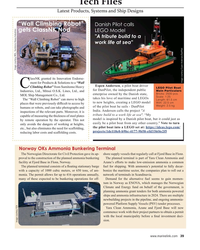 )
April 2024 - Maritime Reporter and Engineering News page: 39
)
April 2024 - Maritime Reporter and Engineering News page: 39Tech Files Latest Products, Systems and Ship Designs “Wall Climbing Robot” Danish Pilot calls gets ClassNK Nod LEGO Model "A tribute build to a work life at sea" Image courtesy MOL, Sumitomo Heavy Industries lassNK granted its Innovation Endorse- Image courtesy Espen Andersen/DanPilot ment for
-
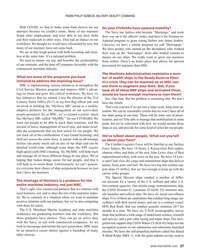 )
April 2024 - Maritime Reporter and Engineering News page: 27
)
April 2024 - Maritime Reporter and Engineering News page: 27RADM PHILIP SOBECK, MILITARY SEALIFT COMMAND With COVID, we had to make some hard choices for our Do your CIVMARs have upward mobility? mariners because we couldn’t rotate. Many of our mariners The Navy has Sailors who become “Mustangs,” and work found other employment, and were able to use their skills
-
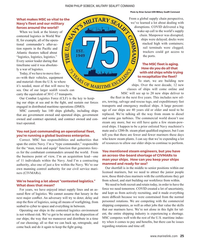 )
April 2024 - Maritime Reporter and Engineering News page: 25
)
April 2024 - Maritime Reporter and Engineering News page: 25RADM PHILIP SOBECK, MILITARY SEALIFT COMMAND Photo by Brian Suriani USN Military Sealift Command From a global supply chain perspective, What makes MSC so vital to the we’ve learned a lot about dealing with Navy’s ? eet and our military disruptions. COVID delivered a big forces around the world? wake-up
-
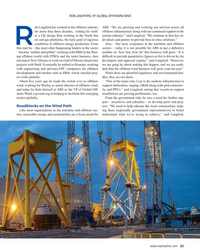 )
April 2024 - Maritime Reporter and Engineering News page: 21
)
April 2024 - Maritime Reporter and Engineering News page: 21ROB LANGFORD, VP, GLOBAL OFFSHORE WIND ob Langford has worked in the offshore industry ABS. “We are growing and evolving our services across all for more than three decades, ‘cutting his teeth’ offshore infrastructure along with our continued support to the in a UK design ? rm working in the North Sea
-
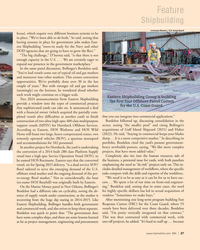 )
April 2024 - Marine News page: 27
)
April 2024 - Marine News page: 27Feature Shipbuilding Loumania Stewart / U.S. Coast Guard focus), which require very different business systems to be in place. “We’ve been able to do both,” he said, noting that having systems in place for government jobs makes East- ern Shipbuilding “move-in ready for the Navy and other DOD agencies
-
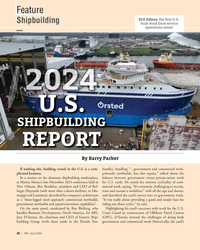 )
April 2024 - Marine News page: 26
)
April 2024 - Marine News page: 26Feature ECO Edison, the ? rst U.S.- Shipbuilding built wind farm service operations vessel. Ørsted U.S. SHIPBUILDING REPORT By Barry Parker If nothing else, building vessels in the U.S. is a com- handle), handling “…government and commercial work, plicated business. primarily newbuilds, but also
-
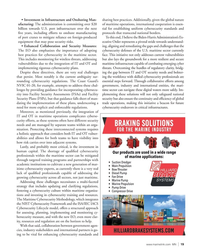 )
April 2024 - Marine News page: 19
)
April 2024 - Marine News page: 19• Investment in Infrastructure and Onshoring Man- sharing best practices. Additionally, given the global nature ufacturing: The administration is committing over $20 of maritime operations, international cooperation is essen- billion towards U.S. port infrastructure over the next tial for establishing
-
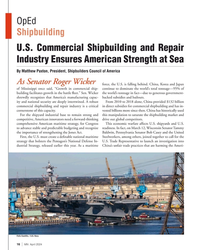 )
April 2024 - Marine News page: 16
)
April 2024 - Marine News page: 16OpEd Shipbuilding U.S. Commercial Shipbuilding and Repair Industry Ensures American Strength at Sea By Matthew Paxton, President, Shipbuilders Council of America As Senator Roger Wicker force, the U.S. is falling behind. China, Korea and Japan of Mississippi once said, “Growth in commercial ship-
-
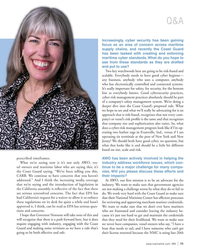 )
April 2024 - Marine News page: 11
)
April 2024 - Marine News page: 11Q&A Increasingly, cyber security has been gaining focus as an area of concern across maritime supply chains, and recently the Coast Guard has been tasked with creating and enforcing maritime cyber standards. What do you hope to see from these standards as they are drafted and put to use? Two key
-
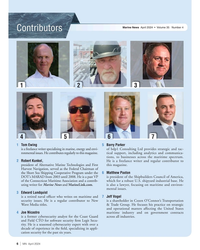 )
April 2024 - Marine News page: 6
)
April 2024 - Marine News page: 6Marine News April 2024 • Volume 35 Number 4 Contributors 1 2 3 5 4 6 7 1 Tom Ewing 5 Barry Parker is a freelance writer specializing in marine, energy and envi- of bdp1 Consulting Ltd provides strategic and tac- ronmental issues. He contributes regularly to this magazine. tical support, including
-
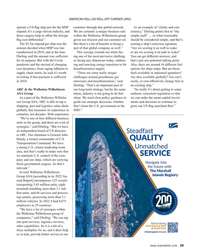 )
February 2024 - Maritime Reporter and Engineering News page: 29
)
February 2024 - Maritime Reporter and Engineering News page: 29AMERICAN ROLL-ON ROLL-OFF CARRIER (ARC) operate a US ? ag ship just for the MSP customer through that global network. As an example of “clarity and con- stipend. It’s a cargo driven industry, and We are certainly a unique business unit sistency,” Ebeling points ? rst to “the those cargoes help to
-
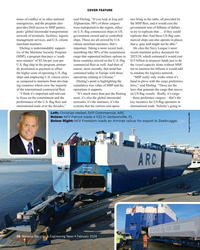 )
February 2024 - Maritime Reporter and Engineering News page: 28
)
February 2024 - Maritime Reporter and Engineering News page: 28COVER FEATURE times of con? ict or in other national said Ebeling. “If you look at Iraq and tors bring to the table, all provided by emergencies, and the program also Afghanistan, 98% of those cargoes the MSP ? eet, and it would cost the provides DoD access to MSP partici- were transported to the
-
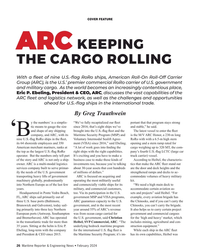 )
February 2024 - Maritime Reporter and Engineering News page: 26
)
February 2024 - Maritime Reporter and Engineering News page: 26COVER FEATURE ARC KEEPING THE CARGO ROLLING With a ? eet of nine U.S.-? ag RoRo ships, American Roll-On Roll-Off Carrier Group (ARC), is the U.S.’ premier commercial RoRo carrier of U.S. government and military cargo. As the world becomes an increasingly contentious place, Eric P. Ebeling, President
-
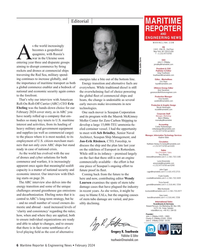 )
February 2024 - Maritime Reporter and Engineering News page: 6
)
February 2024 - Maritime Reporter and Engineering News page: 6Editorial MARITIME REPORTER AND ENGINEERING NEWS M A R I N E L I N K . C O M s the world increasingly HQ 118 E. 25th St., 2nd Floor becomes a geopolitical New York, NY 10010 USA T +1.212.477.6700 quagmire, with Russia’s Awar in the Ukraine soon CEO John C. O’Malley entering year three and disparate
-
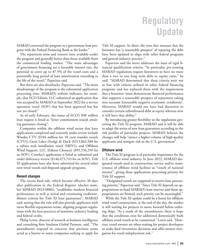 )
February 2024 - Marine News page: 33
)
February 2024 - Marine News page: 33Regulatory Update MARAD converted the program to a government loan pro- Title XI support. In short, the tests that measure that the gram with the Federal Financing Bank as the lender.” borrower has ‘a reasonable prospect’ of repaying the debt The repayment term and interest rates available under have
-
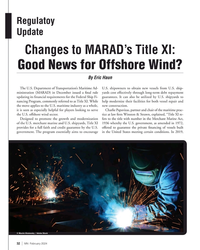 )
February 2024 - Marine News page: 32
)
February 2024 - Marine News page: 32Regulatoy Update Changes to MARAD’s Title XI: Good News for Offshore Wind? By Eric Haun The U.S. Department of Transportation’s Maritime Ad- U.S. shipowners to obtain new vessels from U.S. ship- ministration (MARAD) in December issued a ? nal rule yards cost effectively through long-term debt repayment
-
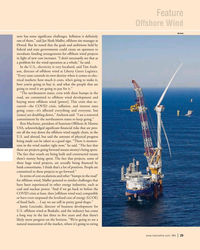 )
February 2024 - Marine News page: 29
)
February 2024 - Marine News page: 29Feature Offshore Wind Ørsted now has some signi? cant challenges. In? ation is de? nitely one of them,” said Jan Sloth Møller, offshore site manager at Ørsted. But he noted that the goals and ambitions held by federal and state governments could create an openness to reevaluate funding arrangements for
-
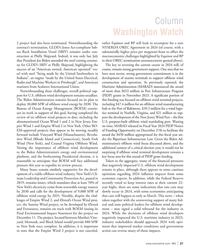 )
February 2024 - Marine News page: 21
)
February 2024 - Marine News page: 21Column Washington Watch 2 project had also been terminated. Notwithstanding the rather Equinor and BP will look to recompete for a new contract’s termination, GLDD’s Jones Act-compliant Sub- NYSERDA OREC Agreement in 2024 (of course, with a sea Rock Installation Vessel (SRIV) remains under con- substantial
-
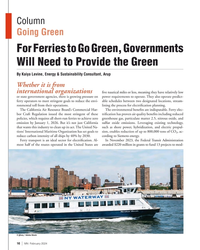 )
February 2024 - Marine News page: 16
)
February 2024 - Marine News page: 16Column Going Green For Ferries to Go Green, Governments Will Need to Provide the Green By Kaiya Levine, Energy & Sustainability Consultant, Arup Whether it is from international organizations ? ve nautical miles or less, meaning they have relatively low or state government agencies, there is growing
-
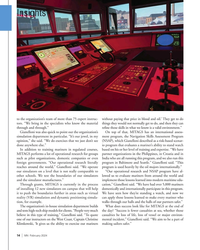 )
February 2024 - Marine News page: 14
)
February 2024 - Marine News page: 14Insights to the organization’s team of more than 75 expert instruc- without paying that price in blood and oil.’ They get to do tors. “We bring in the specialists who know the material things they would not normally get to do, and then they can through and through.” re? ne those skills in what we know
-
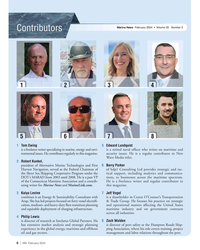 )
February 2024 - Marine News page: 6
)
February 2024 - Marine News page: 6Marine News February 2024 • Volume 35 Number 2 Contributors 3 1 24 6 5 7 8 1 Tom Ewing 5 Edward Lundquist is a freelance writer specializing in marine, energy and envi- is a retired naval of? cer who writes on maritime and ronmental issues. He contributes regularly to this magazine. security
-
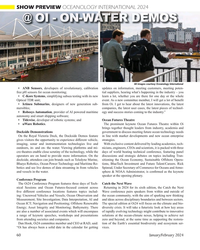 )
January 2024 - Marine Technology Reporter page: 60
)
January 2024 - Marine Technology Reporter page: 60SHOW PREVIEW OCEANOLOGY INTERNATIONAL 2024 All images courtesy Oceanology International • ANB Sensors, developers of revolutionary, calibration updates on information, meeting customers, meeting poten- free pH sensors for ocean monitoring; tial suppliers, hearing what’s happening in the industry – you •
-
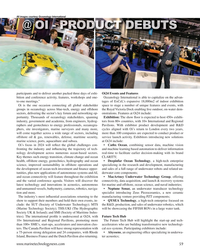 )
January 2024 - Marine Technology Reporter page: 59
)
January 2024 - Marine Technology Reporter page: 59All images courtesy Oceanology International participants and to deliver another packed three days of exhi- Oi24 Events and Features bition and conference activity, features, workshops and one- Oceanology International is able to capitalize on the advan- to-one meetings.” tages of ExCeL’s expansive 18
-
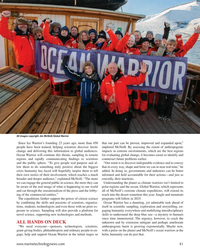 )
January 2024 - Marine Technology Reporter page: 41
)
January 2024 - Marine Technology Reporter page: 41All images copyright Jim McNeill/Global Warrior Since Ice Warrior’s founding 23 years ago, more than 450 that our part can be proven, improved and expanded upon,” people have been trained, helping scientists discover Arctic implored McNeill. By assessing the extent of anthropogenic change and delivering
